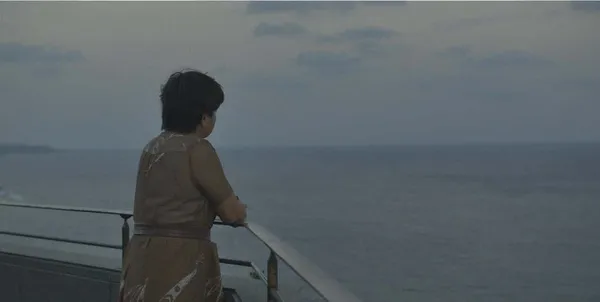Eye For Film >> Movies >> Yukiko (2018) Film Review
Yukiko
Reviewed by: Jennie Kermode

The first thing one notices about Noh Young Sun's documentary is the sound design. A neglected element in many films, at least in terms of its potential as a foregrounded artistic tool, here it is powerful, immersive. The wind is not violent but is all around us, filling up the sky with its voice. It rattles through the reeds, speaking to the isolation of the marshland through which we are walking. Close-up imagery overwhelms the senses. Each stem seems vital, full of detail, so that it takes a moment to gain a broader perspective, to begin to wonder where we are - or who we are. The low camera angle positions us at child height, following a woman. Noh's soft narration begins, telling a story which might belong to the woman or to nobody. We never see the woman's face.
Sound like this is a rarity because it emphasises the smallness of the human players. Noh uses it to communicate the vulnerability of her subjects in the currents of world history. Her long, slow takes with their focus on the natural environment make even her story feel small, just a fragment of a much bigger picture. In later scenes we will see her sitting in a hotel room talking, but by the the mood has been established; the film never feels conventional. The room seems to represent the modern world, itself emerging by chance from a chaotic past in which the people she speaks of were much more directly assailed by the elements.
This is the story of Noh's mother and, beyond that, her grandmother, of whom little is known. It's the story of a girl raised (as many Koreans of her generation were) to hate the Japanese, only to learn that her own mother was Japanese. It's a story about war and about the awful decisions that had to be made, only two generations ago, for the sake of survival. And it's a story about trying to reach out, to know and to mourn somebody who has been cut off and stolen away by time.
The human tragedy at the centre of this tale brings historic events crashing into the present and makes the impact of the war on human lives a much more tangible reality. The film is melancholy, contemplative, much more directly in touch with the emotional landscape than most documentary works. There's a poetic quality about it. Small though the story may be, we feel its weight. Noh sits on the beach, grains of sand spilling through her fingers. The sea laps at the shore with waves small but relentless. She is embedded in the vastness of the world where individuals histories are easily washed away and cinema, defying this, becomes as act of rebellion.
Reviewed on: 12 Nov 2019
















